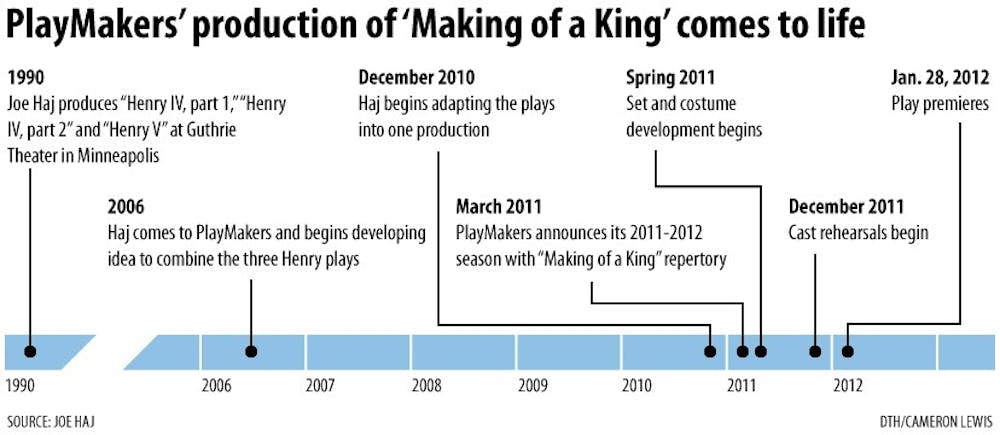He has dreamed of a project that encompasses the plays since he came to PlayMakers in 2006.
In December 2010, he finally began to comb through nearly 3,000 lines of Shakespearean histories, preparing to trim and adjust them for the production.
The final product focuses on Prince Hal’s journey from his irresponsible youth in feudal England to his maturity as leader of one of the first nation-states.
Haj, along with dramaturg Adam Versenyi and co-director Mike Donahue, adapted the three scripts into one mega-story over the summer of 2011.
“We don’t want to lose anyone on the way, but we want to make sure they’ll be up on the particular themes and points we want to stretch,” said Versenyi, who researches and helps develop the historical context for the company’s shows.
The team cut entire subplots, focusing on the development of Prince Hal — eventually Henry V — and making the project manageable.
While putting together the script, they strove to tell Hal’s story in the easiest way for the audience to follow, noting that the seven-hour production is a big commitment for the viewers who choose to see both in one day.
“It’s like when you sit down and watch a whole season of TV on Netflix,” Donahue said. “It becomes about an act of endurance and participating in an event.”
He said the length of the production will closely bond the audience with the characters acting out their lives in front of them.
“It becomes about spending a day, or two nights, with people you really care about,” he said.
Informing Prince Hal’s transformation is England’s constant state of war — an aspect Haj thinks modern audiences can relate to.
“For a country like ours, that’s been in wars for most of the last 25 years, it seems like an important moment for these plays,” he said. “They really explore the cost of war should one choose to wage it.”
To get the day's news and headlines in your inbox each morning, sign up for our email newsletters.
Versenyi said the strength of the plays is the combination of such timeless themes with the thrills of historic live action.
“The actors are not a bunch of kids sitting in their pajamas shooting drones on a screen in Pakistan,” he said.
“It’s visceral; it’s in your face; it’s close up.”
The physicality of the fighting consumed the scenes rehearsed during a technical rehearsal.
During one rehearsal, 15 minutes were spent on a brawl scene that runs less than a minute in the final production.
One of Falstaff’s men appeared to kick another in the crotch.
“You can go a little higher,” said the receiver of the kick.
In order for the production to run smoothly, such details have to be given their due.
The intricacies of Shakespeare make “The Making of a King” a fresh challenge despite the company’s history with tackling large, multi-part productions.
The large number of characters — 85 are played by 24 actors — means almost all the actors are playing two or three characters, and some are playing as many as six.
Winters said he suggests the audience brush up on characters and stories before seeing the plays.
But Versenyi stressed that the information included in the program is enough to make the plays comprehensible.
“You don’t need to get a degree in British history to understand what Shakespeare’s trying to do,” he said.
The rise of King Henry V is best illustrated when both plays are seen in one day, Donahue said.
“The real opportunity is seeing the whole arc.”
Haj said the epic component is becoming PlayMakers’ specialty — and something audiences love.
“We’ve really enjoyed in the past several years doing these epic journeys and taking these epic journeys,” he said.
“It’s galvanizing for us, and it’s galvanizing for the community.”
Contact the Arts Editor
at arts@dailytarheel.com.




